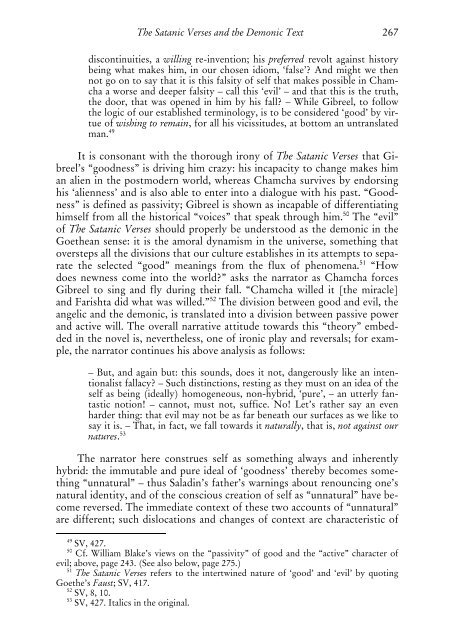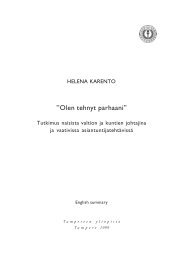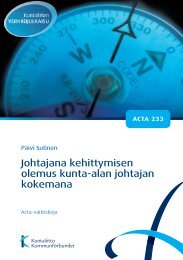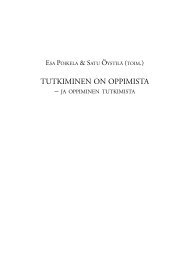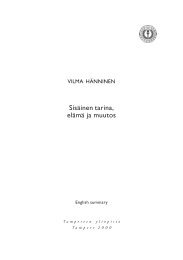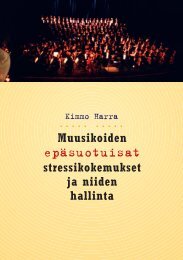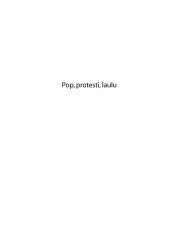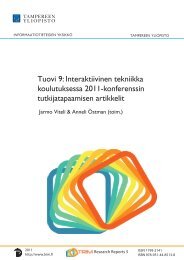Note on this edition: this is an electronic version of the 1999 book ...
Note on this edition: this is an electronic version of the 1999 book ...
Note on this edition: this is an electronic version of the 1999 book ...
You also want an ePaper? Increase the reach of your titles
YUMPU automatically turns print PDFs into web optimized ePapers that Google loves.
The Sat<strong>an</strong>ic Verses <strong>an</strong>d <strong>the</strong> Dem<strong>on</strong>ic Text 267d<strong>is</strong>c<strong>on</strong>tinuities, a willing re-inventi<strong>on</strong>; h<strong>is</strong> preferred revolt against h<strong>is</strong>torybeing what makes him, in our chosen idiom, ‘false’? And might we <strong>the</strong>nnot go <strong>on</strong> to say that it <strong>is</strong> <strong>th<strong>is</strong></strong> falsity <strong>of</strong> self that makes possible in Chamchaa worse <strong>an</strong>d deeper falsity – call <strong>th<strong>is</strong></strong> ‘evil’ – <strong>an</strong>d that <strong>th<strong>is</strong></strong> <strong>is</strong> <strong>the</strong> truth,<strong>the</strong> door, that was opened in him by h<strong>is</strong> fall? – While Gibreel, to follow<strong>the</strong> logic <strong>of</strong> our establ<strong>is</strong>hed terminology, <strong>is</strong> to be c<strong>on</strong>sidered ‘good’ by virtue<strong>of</strong> w<strong>is</strong>hing to remain, for all h<strong>is</strong> vic<strong>is</strong>situdes, at bottom <strong>an</strong> untr<strong>an</strong>slatedm<strong>an</strong>. 49It <strong>is</strong> c<strong>on</strong>s<strong>on</strong><strong>an</strong>t with <strong>the</strong> thorough ir<strong>on</strong>y <strong>of</strong> The Sat<strong>an</strong>ic Verses that Gibreel’s“goodness” <strong>is</strong> driving him crazy: h<strong>is</strong> incapacity to ch<strong>an</strong>ge makes him<strong>an</strong> alien in <strong>the</strong> postmodern world, whereas Chamcha survives by endorsingh<strong>is</strong> ‘alienness’ <strong>an</strong>d <strong>is</strong> also able to enter into a dialogue with h<strong>is</strong> past. “Goodness”<strong>is</strong> defined as passivity; Gibreel <strong>is</strong> shown as incapable <strong>of</strong> differentiatinghimself from all <strong>the</strong> h<strong>is</strong>torical “voices” that speak through him. 50 The “evil”<strong>of</strong> The Sat<strong>an</strong>ic Verses should properly be understood as <strong>the</strong> dem<strong>on</strong>ic in <strong>the</strong>Goe<strong>the</strong><strong>an</strong> sense: it <strong>is</strong> <strong>the</strong> amoral dynam<strong>is</strong>m in <strong>the</strong> universe, something thatoversteps all <strong>the</strong> div<strong>is</strong>i<strong>on</strong>s that our culture establ<strong>is</strong>hes in its attempts to separate<strong>the</strong> selected “good” me<strong>an</strong>ings from <strong>the</strong> flux <strong>of</strong> phenomena. 51 “Howdoes newness come into <strong>the</strong> world?” asks <strong>the</strong> narrator as Chamcha forcesGibreel to sing <strong>an</strong>d fly during <strong>the</strong>ir fall. “Chamcha willed it [<strong>the</strong> miracle]<strong>an</strong>d Far<strong>is</strong>hta did what was willed.” 52 The div<strong>is</strong>i<strong>on</strong> between good <strong>an</strong>d evil, <strong>the</strong><strong>an</strong>gelic <strong>an</strong>d <strong>the</strong> dem<strong>on</strong>ic, <strong>is</strong> tr<strong>an</strong>slated into a div<strong>is</strong>i<strong>on</strong> between passive power<strong>an</strong>d active will. The overall narrative attitude towards <strong>th<strong>is</strong></strong> “<strong>the</strong>ory” embeddedin <strong>the</strong> novel <strong>is</strong>, never<strong>the</strong>less, <strong>on</strong>e <strong>of</strong> ir<strong>on</strong>ic play <strong>an</strong>d reversals; for example,<strong>the</strong> narrator c<strong>on</strong>tinues h<strong>is</strong> above <strong>an</strong>alys<strong>is</strong> as follows:– But, <strong>an</strong>d again but: <strong>th<strong>is</strong></strong> sounds, does it not, d<strong>an</strong>gerously like <strong>an</strong> intenti<strong>on</strong>al<strong>is</strong>tfallacy? – Such d<strong>is</strong>tincti<strong>on</strong>s, resting as <strong>the</strong>y must <strong>on</strong> <strong>an</strong> idea <strong>of</strong> <strong>the</strong>self as being (ideally) homogeneous, n<strong>on</strong>-hybrid, ‘pure’, – <strong>an</strong> utterly f<strong>an</strong>tasticnoti<strong>on</strong>! – c<strong>an</strong>not, must not, suffice. No! Let’s ra<strong>the</strong>r say <strong>an</strong> evenharder thing: that evil may not be as far beneath our surfaces as we like tosay it <strong>is</strong>. – That, in fact, we fall towards it naturally, that <strong>is</strong>, not against ournatures. 53The narrator here c<strong>on</strong>strues self as something always <strong>an</strong>d inherentlyhybrid: <strong>the</strong> immutable <strong>an</strong>d pure ideal <strong>of</strong> ‘goodness’ <strong>the</strong>reby becomes something“unnatural” – thus Saladin’s fa<strong>the</strong>r’s warnings about renouncing <strong>on</strong>e’snatural identity, <strong>an</strong>d <strong>of</strong> <strong>the</strong> c<strong>on</strong>scious creati<strong>on</strong> <strong>of</strong> self as “unnatural” have becomereversed. The immediate c<strong>on</strong>text <strong>of</strong> <strong>the</strong>se two accounts <strong>of</strong> “unnatural”are different; such d<strong>is</strong>locati<strong>on</strong>s <strong>an</strong>d ch<strong>an</strong>ges <strong>of</strong> c<strong>on</strong>text are character<strong>is</strong>tic <strong>of</strong>49 SV, 427.50Cf. William Blake’s views <strong>on</strong> <strong>the</strong> “passivity” <strong>of</strong> good <strong>an</strong>d <strong>the</strong> “active” character <strong>of</strong>evil; above, page 243. (See also below, page 275.)51 The Sat<strong>an</strong>ic Verses refers to <strong>the</strong> intertwined nature <strong>of</strong> ‘good’ <strong>an</strong>d ‘evil’ by quotingGoe<strong>the</strong>’s Faust; SV, 417.52 SV, 8, 10.53SV, 427. Italics in <strong>the</strong> original.


